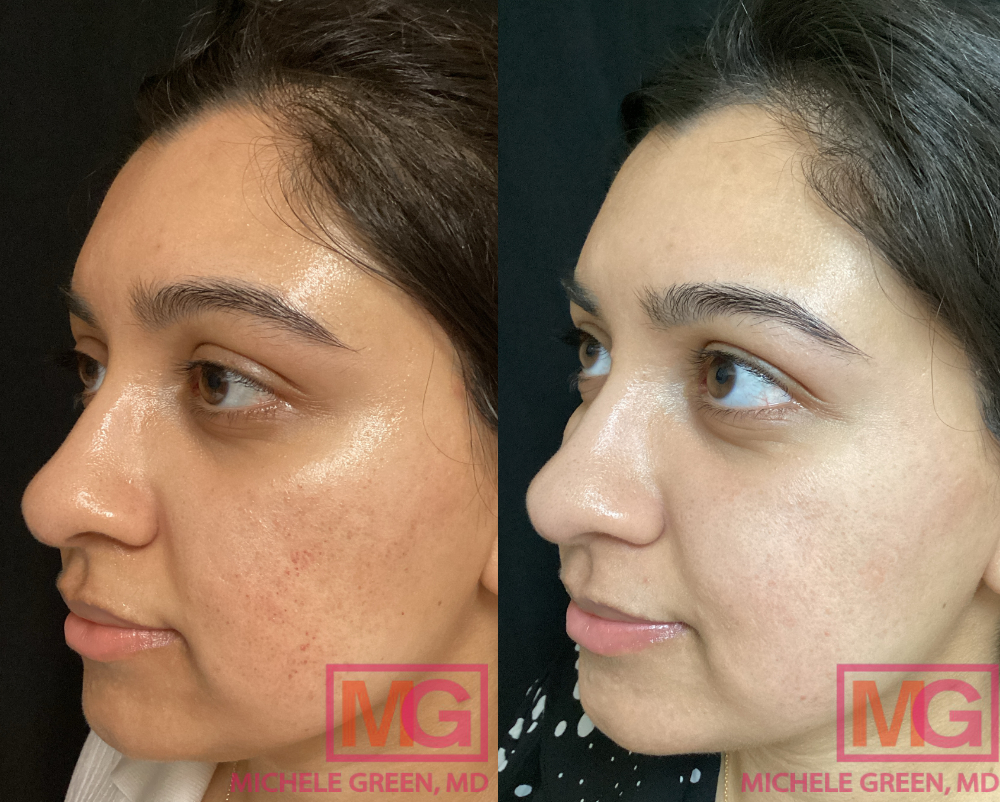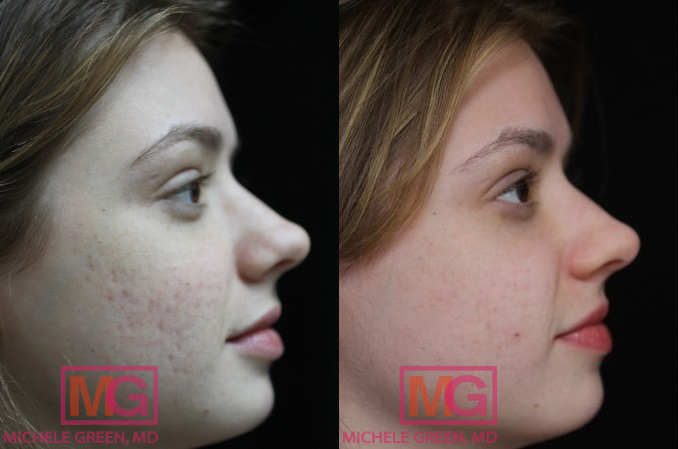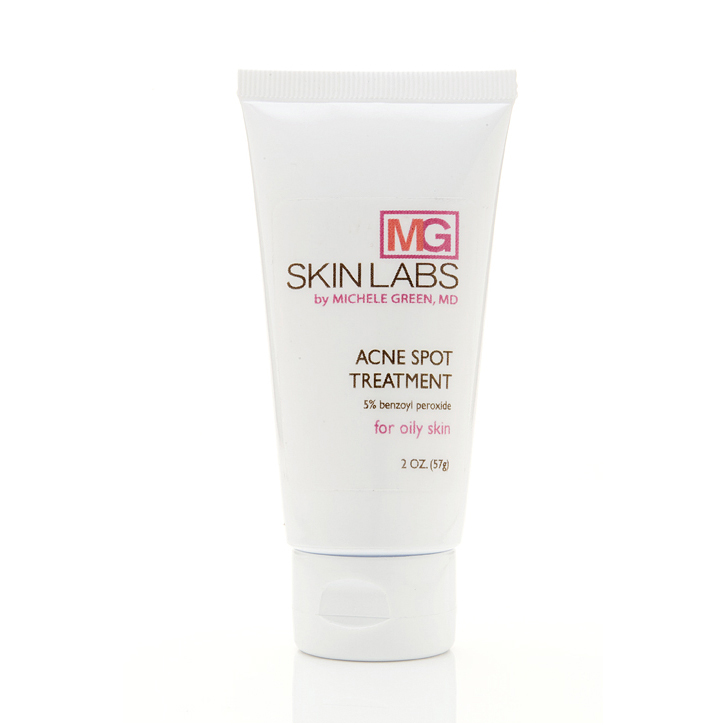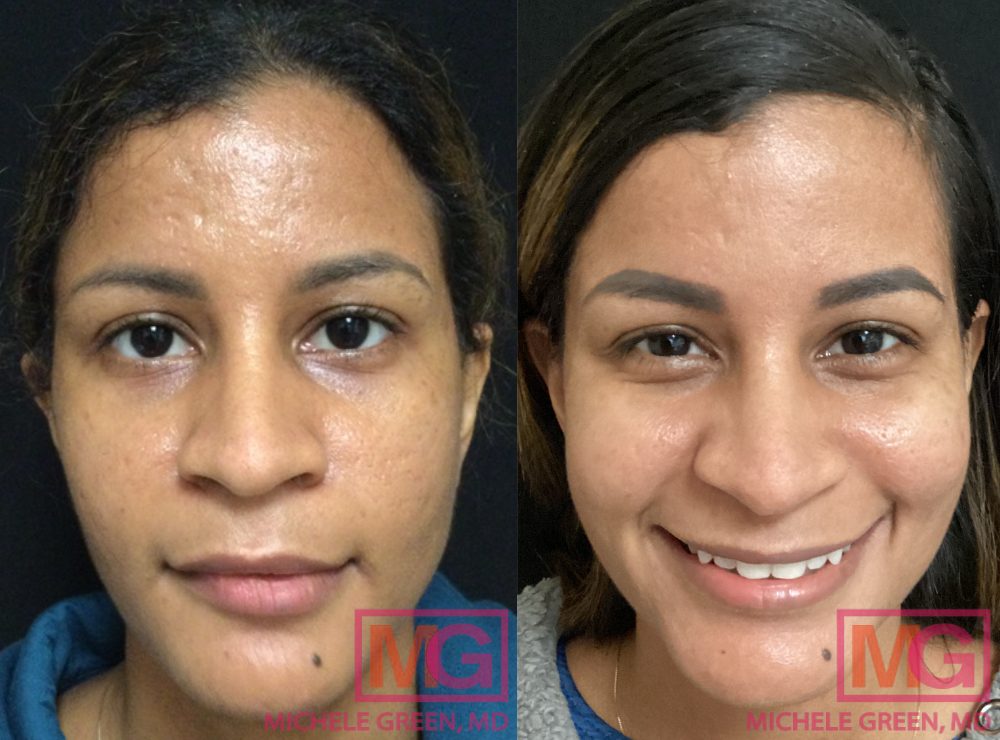How to Fade Acne Scars
Experiencing acne scarring and dark marks can be incredibly frustrating, especially after spending so much effort into dealing with the original acne breakouts. Acne scarring occurs as a result of permanent damage to underlying scar tissue. As a result, inappropriate collagen levels are produced during the healing process. Atrophic or depressed scars form when insufficient collagen is produced. Hypertrophic or raised scars form when too much collagen is produced. Dark spots, also known as post-inflammatory hyperpigmentation, can also develop after an acne breakout, though these spots are not technically true acne scarring. Acne scars can be incredibly hard to treat, but luckily, many non-invasive treatment options are available to fade acne scars. Dr. Michele Green in New York City is an expert in the field of cosmetic dermatology and carries innovative treatment options designed to reduce the appearance of acne scars.
Some of the most effective treatment options for fading acne scars include laser treatments, subcision with dermal fillers, chemical peels, and microneedling. Resurfacing lasers like Fraxel, eMatrix, and Clear + Brilliant can stimulate collagen production to create smoother, more even textured skin. The VBeam laser is excellent for reducing red pigmentation left behind from old acne. Subcision breaks apart underlying scar tissue, allowing for dermal fillers to be injected to restore lost volume and smooth the skin. Chemical peels like TCA peels, Mesopeels, and Cosmelan can help fade post-inflammatory hyperpigmentation. Microneedling, also known as collagen induction therapy, can improve skin texture and tone. With so many treatment options available, it’s hard to choose the best treatment to fade your specific acne scars. If you are tired of your acne scars and are ready to achieve clear, radiant skin, Dr. Green is here to help.
Dr. Michele Green is a board-certified dermatologist with over 25 years of experience treating the world’s most discerning men and women with non-invasive treatment options, including laser therapies, dermal fillers, and Botox. Dr. Green employs a holistic approach to cosmetic dermatology, customizing each patient’s treatment plan to their specific acne scars, skin type, tone, and concerns. She is consistently voted as one of NYC’s top dermatologists by Castle Connolly, Super Doctors, New York Magazine, and The New York Times due to her expertise and dedication to her patients. When you consult with Dr. Green, she will assess your medical history and unique acne scars to devise a treatment plan to leave you with a smooth, beautiful complexion that lasts.
What are acne scars?
Acne scars are scars left behind after an inflammatory acne lesion. The inflammation produced from a cyst, nodule, or infected pimple causes irreparable damage to underlying skin tissue. When too little collagen is produced during the skin’s wound-healing process, a depressed scar forms. When too much collagen is produced, a raised scar forms. Acne lesions like blackheads and whiteheads are not typical culprits of acne scarring due to the lack of inflammation present. Unfortunately, acne scars are permanent due to the trauma created in the skin. However, their appearance can be minimized by many different non-invasive cosmetic procedures in Dr. Michele Green’s NYC dermatology office, including lasers, microneedling, dermal fillers, and chemical peels.

What are the different types of acne scars?
Atrophic scars
Atrophic acne scars are depressed scars that form when insufficient collagen is produced during wound healing. These scars appear as shallow or deep indentations in the skin. The three subtypes of atrophic scars include rolling scars, boxcar scars, and ice-pick scars. Rolling scars are shallow, wave-like indentations that seem to “roll” on the skin’s surface. Boxcar scars are oval- or round-shaped indentations with deep vertical sides and well-defined edges. Ice-pick scars are deep, narrow V-shaped indentations on the skin’s surface.
Hypertrophic scars
Hypertrophic acne scars are raised scars that form as a result of an overproduction of collagen. Hypertrophic scars are characterized as growths that appear to be the same size as the initial wound. Keloid scars are a subtype of hypertrophic scars that are characterized by raised growths that can grow larger than the initial wound or acne lesion. Hypertrophic scars may become less noticeable over time; keloids, however, may continue to grow after healing without any treatment. Often, a combination of treatments, including intralesional cortisone injections, silicone gel sheets, and lasers like VBeam, are best to flatten keloids.
What is post-inflammatory hyperpigmentation?
Post-inflammatory hyperpigmentation (PIH) refers to the dark spots that remain after inflammatory lesions. During the wound-healing process, skin cells can overproduce melanin, resulting in hyperpigmented lesions that may appear brown, red, black, pink, or purple on the skin. Other inflammatory conditions, such as eczema and psoriasis, can also result in the development of PIH. It is important to note that PIH is not the same as true acne scars, as there is no lasting tissue damage, and these marks can gradually lighten with time.
How long does it take to fade acne scars?
Unfortunately, acne scars are permanent and will not fade on their own. Luckily, many different treatment options exist to minimize the appearance of and fade acne scars with little to no downtime. Cosmetic procedures are the fastest way to fade acne scars and achieve a smoother complexion. Often, patients have a mixture of acne scar types on their skin, and a combination approach to treatment is best to help smooth the skin for a more even-textured appearance. When you consult with Dr. Green, she will assess your medical history and skin concerns to devise a treatment plan tailored to help you look and feel like your best self again.

Acne scar treatments
Laser therapy
The VBeam laser creates the gold standard for eliminating red pigmentation from the skin, including PIH, facial redness, and broken blood vessels, on the skin. The VBeam is a pulsed dye laser that delivers energy that exclusively targets red pigmentation, leaving the surrounding skin unaffected. There is no downtime associated with VBeam treatment, allowing patients to resume their daily activities afterward. Typically, patients require multiple treatments spaced one month apart to see the best cosmetic results.
The Fraxel Dual laser is often referred to as the “magic eraser” due to its effectiveness in minimizing acne, scars, uneven texture, fine lines, wrinkles, and sun damage. Its 1550nm setting is excellent for reducing the appearance of atrophic scars and texture irregularities, while its 1927nm setting is best for treating pigmentation from sun exposure. The Fraxel laser emits fractionated energy to heat the inner layer of skin and induce the production of new collagen. Fraxel only treats a portion of the skin at a time, leaving the surrounding skin unaffected and reducing recovery time. Patients typically experience mild redness after treatment that resolves independently within 48 hours. Generally, three to five treatment sessions spaced one month apart are recommended to treat acne scars.
The eMatrix laser is an excellent laser for reducing acne scarring and texture irregularities in patients of all skin tones, including darker skin tones. This laser employs radiofrequency to heat the dermal layer of the skin and stimulate collagen production, reducing the appearance of acne scars, uneven texture, fine lines, and wrinkles. Similarly to the Fraxel laser, patients typically experience mild redness for 48 hours after treatment. Dr. Green recommends patients undergo a series of treatment sessions spaced four weeks apart to fade acne scars.
The Clear + Brilliant laser, often referred to as a “mini-Fraxel,” is a gentle laser that treats a variety of skin concerns, including mild acne scars, fine lines, wrinkles, enlarged pore size, and pigmentation due to sun damage. This laser uses fractionated energy to stimulate collagen production and rejuvenate the skin. There is no downtime with Clear + Brilliant laser treatment, and patients can return to the office every two to four weeks for another session. Clear + Brilliant is recommended for patients with shallow, depressed acne scars. As treatment with Clear + Brilliant is gradual, patients typically need four to six treatment sessions for facial rejuvenation.
Dermal fillers and subcision
Subcision is a technique used to break apart underlying scar tissue that forms as a result of an inflammatory acne lesion. During the procedure, a needle is placed under the skin to break apart the fibrous bands that tether the scar tissue to the top layer of skin. Dr. Green does not recommend performing subcision for depressed acne scars alone, as the area can look the same or worse after treatment. Instead, Dr. Green pairs subcision with dermal fillers to replenish lost volume to the area for a smoother, more even-textured look. Hyaluronic acid fillers like Juvederm and Restylane can attract moisture to the injected area for an immediate increase of suppleness and plumpness. Sculptra is an injectable dermal filler that uses poly-L-lactic acid to stimulate collagen in the injected area for smoother, more plump skin. Juvederm and Restylane can last for nine to twelve months, while Sculptra can last for up to two years after an initial series of injections. When you consult with Dr. Green, she will choose the best dermal filler based on your specific acne scars and skin concerns.
Chemical Peels
Chemical peels are a popular option for treating post-inflammatory hyperpigmentation and improving the appearance of these dark spots. Chemical peels use a chemical exfoliant, such as trichloroacetic acid (TCA), glycolic acid, lactic acid, or salicylic acid, to exfoliate the skin, remove dead, pigmented cells from the skin’s surface, and stimulate collagen production. They are an excellent treatment option for patients looking to smooth the skin’s surface and reduce the appearance of post-inflammatory hyperpigmentation. TCA peels are best suited for patients with light or fair skin types. Patients with darker skin types cannot tolerate acid as strongly as patients with lighter skin types, so special care in the strength of the acid peel is an important consideration. Mesopeels are a specially formulated chemical peel that contains tranexamic acid, kojic acid, and azelaic acid to brighten and rejuvenate the skin. These peels are designed to treat patients of all skin tones, including darker skin tones, without the risk of adverse side effects. Patients often need a series of three to six peels spaced one month apart to see improvement in their acne scars.
Microneedling
Microneedling, or collagen induction therapy, is highly effective in treating depressed acne scars on the skin. Microneedling uses tiny, surgical-grade needles to create micro-channels in the skin, stimulating the body’s wound-healing process and producing new collagen. This procedure can improve the appearance of acne scars as well as fine lines, wrinkles, enlarged pore size, and hyperpigmentation. Often, a series of three or more treatment sessions spaced three to four weeks apart is required for the best cosmetic results. One benefit of microneedling is that it allows for increased absorption of topical serums or products. For patients with post-inflammatory hyperpigmentation, Dr. Green recommends incorporating a proprietary depigmentation solution into the microneedling treatment. All patients can benefit from adding platelet-rich plasma (PRP) to the procedure. PRP is taken from the patient’s blood and is rich in growth factors and proteins necessary for tissue healing and regeneration. Applying PRP during the microneedling procedure can enhance its benefits and further rejuvenate the skin.
Vivace RF Microneedling
Vivace RF Microneedling is a new, innovative cosmetic procedure that combines the benefits of microneedling and radiofrequency treatment. The procedure uses a microneedling handpiece to create controlled micro-injuries in the epidermis and stimulate collagen production. At the same time, radiofrequency energy is delivered deep into the dermis to stimulate the wound-healing process and collagen synthesis. There is zero downtime with the procedure, and patients can look forward to decreased acne scars, fine lines, wrinkles, and pigmentations as a result of new collagen production occurring in both the epidermal and dermal layers of skin. Dr. Green typically recommends a series of three treatment sessions spaced one month apart for optimal results.
Microdermabrasion
Microdermabrasion is a non-invasive procedure that stimulates collagen production to create a more even skin texture and reduce the appearance of acne scars. The traditional microdermabrasion procedure uses tiny aluminum oxide or sodium bicarbonate crystals to exfoliate the outer layer of skin gently. Diamond microdermabrasion utilizes a diamond-tipped handpiece to sand away the skin’s surface. Microdermabrasion is painless and does not require any downtime.
Dermabrasion
Dermabrasion is a more invasive form of microdermabrasion. Instead of gently exfoliating the skin, it removes the entire epidermis, or top layer. The procedure is generally done under anesthesia, and it can take several weeks for the skin to heal completely. Due to the increased risk of hyperpigmentation or scarring after treatment, dermabrasion is not recommended for patients with a history of keloid scarring or darker skin.
Intralesional Cortisone Injections
Intralesional cortisone injections are the best way to shrink and flatten hypertrophic and keloid scars. Cortisone’s anti-inflammatory properties reduce collagen production and inhibit new scar tissue growth. Multiple treatment sessions are typically needed to decrease the size and volume of these scars.

What helps fade scars? Topical skincare products
The best treatment plan to fade acne scars begins with a good skin care routine at home. Proper skincare is essential to maintaining and enhancing results from any office procedure. Dr. Green formulated her proprietary skincare line, MGSKINLABS Inc., to target and treat a variety of skin conditions and concerns, including acne scarring, hyperpigmentation, and anti-aging. When you consult with Dr. Green, she will assess your skin to devise a skincare regimen that will complement your treatment plan. Your skincare regimen may include a combination of over-the-counter and prescription products, depending on your specific concerns and needs.
Proper skin cleansing is important to help prevent new blemishes or acne breakouts. Many patients with acne-prone skin look for cleansers with alpha hydroxy acids (AHAs) or beta hydroxy acids (BHAs). AHAs like glycolic acid and BHAs like salicylic acid gently exfoliate the skin, removing dead skin cells, excess sebum, and other impurities from the pores. MGSKINLABs’ Pore Minimizing Cleanser contains a blend of glycolic and salicylic acid to cleanse the pores for clearer, smoother skin deeply. Patients with sensitive skin may find that hydroxy acids are too irritating. Instead, they can use a gentle cleanser and toner to clean the skin properly.
Retinol and retinoids are excellent skincare products for patients with acne scars. These products are derived from vitamin A and work to exfoliate the skin, increase the rate of skin cell turnover, and stimulate collagen production. Retinols can be found over the counter, while retinoids like tretinoin or Retin-A are only available through prescription by a board-certified dermatologist or healthcare provider. The Essential Antioxidant Infusion from MGSKINLABs contains a unique blend of retinol, vitamins, and essential nutrients to improve skin texture and tone and reduce the appearance of acne scars, fine lines, and wrinkles.
Patients experiencing post-inflammatory hyperpigmentation can benefit from skin lightening or brightening agents. Hydroquinone is a prescription-strength lightening agent which slowly reduces dark spots on the skin. It is important only to use hydroquinone under the care of a board-certified dermatologist, as overuse or improper use can result in worsened hyperpigmentation. The Skin Brightening Cream from MGSKINLABs is a non-hydroquinone-based product, containing lactic acid, glycolic acid, and kojic acid to minimize discoloration and even out skin tone.
Sunscreen is an essential step in any skincare regimen to protect the skin from UV damage and prevent the worsening of hyperpigmentation. It is especially important when using hydroquinones and retinoids, as these products make the skin more photosensitive. Patients should use a broad-spectrum sunscreen with an SPF of 50 for best protection. MGSKINLABs’ Hydrating SPF 50 contains zinc oxide to protect the skin as well as hyaluronic acid and lactic acid to hydrate and soften the skin.
Does Vitamin C help fade acne scars?
Yes! Vitamin C is an excellent skincare product that helps create more evenly textured and toned skin. It increases skin cell turnover, removing dead pigmented cells to bring healthy, bright cells to the skin’s surface. Vitamin C also contains powerful antioxidant properties that protect the skin from oxidative stress and free radical damage. The Vita-C Serum from MGSKINLABs contains high-potency vitamin C to revitalize and brighten the skin.
Does CeraVe clear/fade dark spots?
CeraVe is an excellent skincare line that targets a wide range of skin concerns, including acne scars, anti-aging, hyperpigmentation, dryness, and oiliness. It carries products specifically for acne-prone skin that contain salicylic acid to cleanse and exfoliate the skin. The line also contains various retinol-based products to soften skin texture and reduce the appearance of acne scars and discoloration. CeraVe also carries sunscreens to protect patients of all skin types and tones from harmful UV rays.
Can I fade acne scars naturally? Home remedies and natural remedies for acne scar treatment
Patients often wonder, “Can you make acne scars fade away naturally?” Unfortunately, home or natural remedies are not strong enough to treat acne scars. Acne scars form as a result of permanent damage to underlying tissue and must be treated by a board-certified dermatologist to reduce their appearance. Currently, no home remedy or natural ingredient can penetrate deep into the epidermis or dermis to affect scar tissue or collagen production. Expert board-certified dermatologist Dr. Green can tailor an effective treatment plan to help you remove your acne scars and achieve a clear, smooth complexion.
How to fade pimple scars naturally with aloe vera
Aloe vera is a plant with anti-inflammatory properties that can reduce inflammation and redness. It also contains a compound called aloesin, which can minimize melanin production and reduce hyperpigmentation and dark spots from acne lesions. Most clinical studies on aloe vera application are related to burns and scars. More research is needed to determine its efficacy for treating and fading acne scars. Aloe vera is available in a number of over-the-counter products, though some individuals prepare it directly from the plant. While aloe vera is known for its soothing properties, it is important to remember that any ingredient can irritate the skin, especially for patients with preexisting conditions like psoriasis or eczema. If you are curious about aloe vera for fading pimple scars, it is best to conduct a patch test to ensure that no irritation occurs. Consulting with a board-certified dermatologist like Dr. Green is always best to ensure that the products you are using for your acne scar treatment are both safe and effective.
Can acne scars be 100% removed?
While acne scars cannot be 100% removed, their appearance can be greatly reduced with non-invasive treatments. Lasers, chemical peels, microneedling, and dermal fillers all work to stimulate collagen production deep within the skin to smooth the skin’s texture and fade away depressed acne scars. Intralesional cortisone injections can reduce inflammation underneath the skin and flatten hypertrophic and keloid scars. Dr. Green has over 25 years of experience treating her patients with acne scars and can choose the correct non-invasive treatments to help you fade your acne scars. Often, a combination of in-office treatments and targeted skincare products is best to minimize the appearance of your acne scars for clear, radiant skin.

How can I fade my acne scars?
The appearance of acne scars on the face can be incredibly frustrating, especially after spending the time and effort into treating the initial acne breakouts. Luckily, board-certified dermatologist Dr. Green in NYC carries a host of non-invasive cosmetic treatments designed to fade away your acne scars. Resurfacing lasers like Fraxel, eMatrix, and Clear + Brilliant, the VBeam laser, chemical peels, microneedling, and subcision with dermal fillers are all excellent treatment options that provide consistently stunning results without any downtime or side effects. Patients often have various types of acne scars present on their skin, and the best acne scars treatment plans involve a unique combination of procedures, prescription topicals, and targeted over-the-counter products. An expert in cosmetic dermatology, Dr. Green will assess your skin and tailor a treatment plan to fade away your acne scars and leave you with a clear, smooth, glowing complexion that lasts.
With over two and a half decades of experience, board-certified cosmetic dermatologist Dr. Michele Green has been expertly treating some of the world’s most discerning men and women with non-invasive procedures, including lasers, dermal fillers, Botox, and more. She is consistently rated as one of NYC’s top dermatologists by Castle Connolly, Super Doctors, New York Magazine, and The New York Times due to her dedication to her patients and expertise. Dr. Green embraces a holistic approach to cosmetic dermatology, utilizing a “less-is-more” philosophy to provide her patients with youthful, natural-looking results. If you’re ready to learn how to fade your acne scars, schedule a consultation with Dr. Green by contacting us online or calling the NYC office at 212-535-3088.
 212-535-3088
212-535-3088